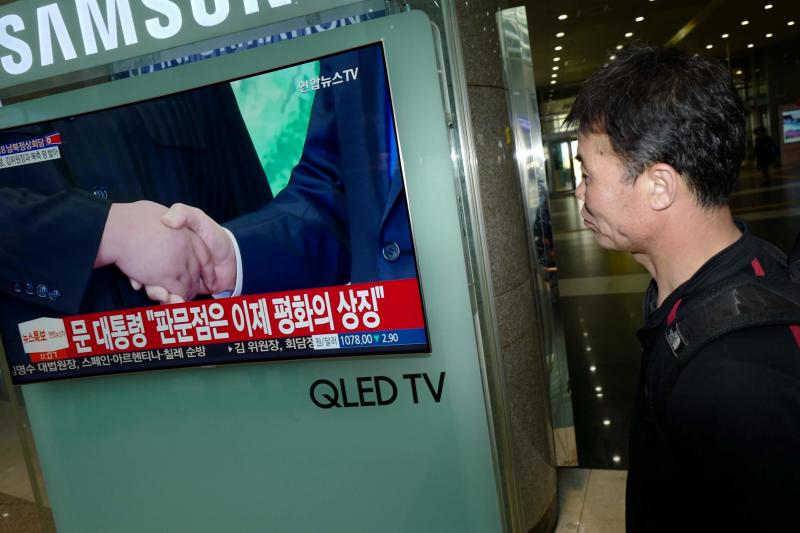North Korea's cyber attacks on the South have continued despite warmer ties, says expert
Sign up now: Get insights on Asia's fast-moving developments

A public screen shows news coverage of South Korea's President Moon Jae In and North Korean leader Kim Jong Un shaking hands during their inter-Korean summit meeting, at a railway station in Seoul on April 27, 2018.
PHOTO: AFP
SEOUL - Inter-Korea ties may have warmed in recent months after Pyongyang's friendly overtures, but attacks from the regime's cyber army have shown no signs of abating, according to a South Korean expert who tracks their activities.
Mr Choi Sang Myung, director of software firm Hauri Inc and an adviser to the police and National Intelligence Service, said North Korea has continued to groom its team of elite hackers, sending them overseas to countries like China and India to study and learn from experts, and allowing them to subscribe to South Korean's tech lectures online.
"Given the reconciliatory mood between the two Koreas, the North no longer attacks the South by sea, air or land. But their attacks have continued in cyberspace and they continue to collect data, which makes me a little sceptical about their friendly gestures," he said.
Even if attacks on the South do ease, the number of North Korean hackers will remain unchanged and they will probably look for other targets, like South-east Asia and Japan, he added.
Speaking on Thursday (May 17) at a Straits Times panel discussion on cyber security at the Asian Leadership Conference in Seoul, Mr Choi said the North has managed to proliferate its cyber activities despite facing stronger sanctions from the United Nations.
The regime, which started launching distributed denial-of-service (DDOS) attacks on the South from the 2000s, is widely blamed for last year's so-called WannaCry ransomware attack, which affected hundreds of thousands of computers found in hospitals, banks, and companies around the world.
North Korean hackers also stole 26 billion won (S$32 million) worth of virtual money from attacks on two South Korean cryptocurrency exchanges last year, followed by 58 billion yen (S$703 million) in cyber currency from one of Japan's largest cryptocurrency exchanges in January this year.
North Korea's cyber threat is so strong now that global tech companies like Microsoft and Adobe, feeling threatened, have gone to South Korea to learn about the North's tactics and develop patches to defend themselves, said Mr Choi.
"People think of North Korea as backward in terms of internet penetration, but they are sending scientists overseas to study and providing students with internet access so they can learn about cyber hacking," he added.
Mr Choi also warned another WannaCry attack could emerge anytime. "We don't know how and when they will do it, so we better find and develop patches to protect ourselves against those attacks."


